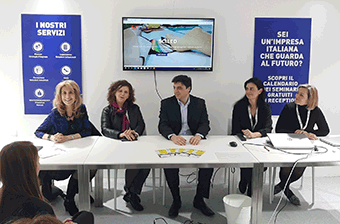There couldn’t be a better venue than the international footwear fair MICAM in Milan for the SciLed Erasmus+ partners to present the first tangible outcomes of their work since the project’s inception a year ago and the first SciLed workshop “Skills under the spotlight” on February, 18th did not deceive. Partners reunited the following day for an intensive meeting at Politecnico di Milano’s premises to set a roadmap of the upcoming year’s priorities. The consortium moves forward with the same goal in mind: develop attractive and cutting-edge training curricula that will teach the new generation of talents the right skills to develop more innovative, comfortable and sustainable shoes that better respond to consumers’ demands.
Getting footwear comfort and sustainability up the list of priorities
When it comes to comfort and sustainability in footwear, research shows a paradoxical situation: consumers’ interest in more comfortable and greener shoes is constantly spiking and while companies acknowledge that healthfulness and sustainability aspects have a major influence on purchasing habits, their potential is under exploited. A SciLed survey involving more than 100 companies shows that comfort and sustainable production are still regarded as second-tier priorities by footwear makers. In addition, focus groups conducted by project partners in five countries show that companies are not always able to translate these needs into new product design specifications.
Killing three birds with one stone: education and skills to the benefit of students, companies and consumers
To better guide companies and upskill employees, two occupation profiles with direct impact on footwear comfort and sustainability will be updated by incorporating three new training modules. Future footwear designers and product developers will have access to learning material that specifically focuses on footwear performance and comfort, footwear sustainability and footwear design engineering. Comfort-related aspects include learning how to understand consumers’ requirements, selecting the right materials and components and incorporating engineering solutions to ensure that comfort criteria are correctly met. Sustainability aspects cover understanding legal requirements and products standards, applying sustainable technologies during the design stage and using new tools to evaluate the environmental impact of a product.
A manifesto to foster Education-Research-Business cooperation
The SciLed Knowledge Alliance is committed to exploit the opportunities of joining Research, Higher Education and Industry and has developed a manifesto to jointly create and foster knowledge and innovation in the footwear industry.
The past year has allowed project partners to get a clearer picture of the issues at stake by trying to understand the needs, expectations and difficulties of footwear companies to keep up with new patterns of consumption. Today’s consumers are increasingly demanding and expect their shoes to have a positive impact on ageing healthily and on the environment they live in. But these very technical aspects require adequate skills that are not yet widely developed. Based on this reality, the project partners have outlined the first elements of training modules that will now need to be fully developed and piloted in Higher Education institutions.
We invite you to keep up with us as our project is confidently writing its next chapter! Follow-us on http://sciled.eu/ and on our dedicated Facebook page. The CEC also has a new Instagram account, so don’t forget to subscribe!
Press release
CEC
25 January 2020








